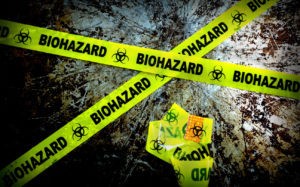Is blood dangerous?
Blood has been a central part of our lives since the dawn of civilization. From its use in medical treatments to its role in religious ceremonies, it is an invaluable resource that has long had both practical and spiritual significance. But while its many benefits are widely recognized, it is also important to remember that blood can be dangerous in certain contexts.
When cleanup after an accident or injury involves the cleanup of blood, caution must be taken as even small amounts can be potentially hazardous. This is because blood may contain dangerous pathogens such as HIV, Hepatitis B & C, and other infectious diseases which can spread through contact with infected bodily fluids. As such, cleanup must be done properly to avoid spreading these pathogens and endangering the safety of yourself and others around you.
In addition to cleanup precautions, there are other measures that should be taken to ensure safety when dealing with blood. For example, wearing gloves and long sleeves when handling blood can help protect your skin from exposure to disease-causing organisms; disinfecting any surface that comes into contact with any amount of blood is also essential, as is proper disposal of contaminated materials like cloths and bandages used for cleanup. Proper waste disposal protocols should also be followed whenever possible; for instance, disposing of used needles or syringes in specially designated containers rather than throwing them away with regular waste is recommended by most health agencies.
Human Blood
While the risks associated with coming into contact with human blood are real and should not be ignored, a fundamental understanding of proper safety protocols combined with common sense practices can go a long way towards reducing the risk posed by hazardous bodily fluids like blood. When faced with cleanup duties involving any amount of blood–even just a single drop–it is always best practice to take all necessary precautions for both your own safety and the safety of those around you.
Blood Cleanup Services in New Orleans
Blood cleanup services in New Orleans are essential for maintaining a safe and healthy environment. Such services are typically provided by professional cleanup companies, who have the knowledge, expertise and equipment to safely handle blood cleanup operations. These cleanup companies understand the complexities of the cleanup process, and can provide specialized assistance to ensure that all contaminated areas are properly disinfected and sanitized.rleans Crime
There are many different types of blood cleanup services available in New Orleans. From basic cleanup and sanitation procedures involving the removal of visible contaminants, to more complex operations requiring advanced decontamination techniques, cleanup experts can provide comprehensive solutions for any type of situation. Whether it is an accident scene or a medical facility cleanup, experienced professionals know how to identify and clean up hazardous materials in a timely manner.
When it comes to blood cleanup, safety is paramount. Professional cleanup companies use proper protective equipment and state-of-the-art methods to remove all traces of blood from surfaces or objects while protecting both workers and clients from potential harm. They also adhere to strict guidelines concerning biohazard disposal, ensuring that no contaminants seep into the environment or spread disease through contact with other people or objects.
Additionally, cleanup teams can offer advice on how best to prevent similar accidents in future by providing detailed assessments of the site where the incident occurred as well as recommendations for appropriate controls going forward.
For those looking for reliable blood cleanup services in New Orleans, using professional assistance is always recommended over attempting such tasks alone due to the high risk involved when dealing with biological contaminants like blood. Professional teams guarantee a thorough job with minimal risk of contamination, helping keep everyone safe from potential hazards posed by improperly handled spills or messes.
